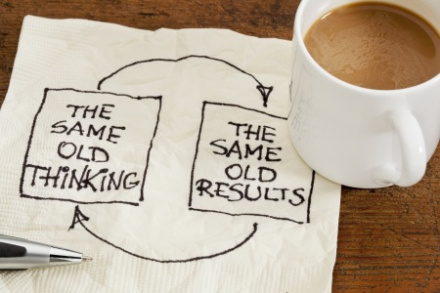Reappraising Thoughts

All behavior begins with a thought. A thought charges a feeling, an emotion and that emotion drives a behavior. This is the overarching cycle of behavior modification. In order to modify a behavior, we have to be able to manage that underlying thought. It is very difficult to change our emotions; they are, for the most part, automatic. We might have a variety of emotions or feelings connected to a single thought. Depending on which emotion is most dominate, the resulting behavior may also change. 
Let’s say you are invited to a weekend conference where you are expected to give opening remarks about the keynote speaker. You have prepared, but this is in front of a large group of influential leaders. The entire morning you are thinking how embarrassing it would be if you misspoke or missed a key point in your introduction. You are honored to have been asked, but being in the spotlight gives you butterflies in your stomach, and more than anything you are anxious about saying the right thing. This anxiety drives you to have one more glass of wine than you normally would. The additional wine leaves you a little aloof and in turn you forget some key information in your speech. Your decision to have a second glass of wine was emotionally driven based on the thought that you might make a mistake in front of your colleagues, and guess what. You did! This is called a self-fulfilling prophesy. You get what you think you are going to get if you let that thought drive your behavior.
Take the same scenario, but change your initial thought about it. Rather than thinking you are going to make a mistake, or forget key information, you see yourself seamlessly introducing your team member. You focus on all the other times you have presented and succeeded in front of a crowd. This thought leads to optimism, confidence and a relaxed demeanor. You only need one glass of wine to enjoy and be social…and you nail the introductory remarks. Boom.
This second scenario is the result of reappraising thoughts. You are presented with the exact same situational elements. The same influential power sitting in the audience, the number of people present and the temptation to have that second glass of wine. However, by changing your perception, you can make the initial thought a more motivating and positive. Your self-appraisal of your own skill-set, and past successes, your resulting emotions and behaviors were changed from being self-sabotaging, to self-supportive.
You can use this skill of reappraisal in any situation whether it is related to work, personal relationships, exercise and nutritional choices, or just everyday to do lists. Remember, your behaviors are the end result. The start of that progression is the automatic thought that triggers the emotion, feelings and then the behavior.
Stop and THINK next time you are presented with a unique or challenging situation. But, remember, before you THINK, what you think can and often will impact the resulting behavior and the outcome.
